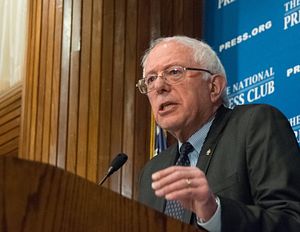Parsing policy positions dominated the kick-off debate of the U.S. democratic presidential candidates in Las Vegas, Nevada. The first of six presidential debates officially sanctioned by the Democratic National Committee introduced underdog candidates – Lincoln Chafee, Martin O’Malley and Jim Webb – on the national stage. Though the three gave respectable performances, their presence mainly served to sharpen the dynamics between presumptive frontrunner Hillary Clinton and Bernie Sanders, Clinton’s most consequential rival based on current poll standings. If Vice President Joe Biden were to enter the race, his candidacy could invigorate the democratic pool with a high-profile, heavyweight contender to Clinton in terms of electability. As a footnote, Lawrence Lessig did not qualify for the debate based on the 1 percent polling threshold.
Going into the debate, candidates had to project presidential persona and define their progressive agenda positions on climate change, income inequality, illegal immigration, jobs, guns, middle class wages, race, college affordability, the Patriot Act, Edward Snowden, and regulating Wall Street. This first round was heavy on domestic policy, and light on foreign policy strategies, with substantive discussion on Asia virtually absent. Although Clinton and Webb touted their national security experience, and the others responded to questions on Russia, Syria, Iran and Libya, none articulated a compelling U.S. foreign policy vision. All democratic candidates would be well-served in future debate rounds to elaborate on their respective foreign policy approaches, and particularly what the U.S. rebalance to Asia would look like under their leadership.
We highlight each candidate’s memorable one-liners and raise additional questions based on their first-round positions:
Hillary Clinton “I’m a progressive who likes to get things done”: As the primary proponent of the Trans-Pacific Partnership in 2011, Hillary Clinton touted the TPP as the “gold standard” of trade deals. With Clinton’s recent decision to oppose the TPP – the centerpiece of US rebalance to Asia – how would she recalibrate the aims of the TPP to build a competitive trading framework with Asian regional allies? Clinton’s explanation that the current TPP does not meet her standard in providing jobs to Americans serves domestic audience consumption, but it does little to reassure Asian partners of U.S. intentions to bolster strategic engagement in the region. Clinton’s taking credit for helping President Barack Obama in “hunting for the Chinese” to secure the Copenhagen Climate Accord in 2009 emphasized more tactical reaction rather than strategic leadership.
Bernie Sanders “We need a political revolution”: Time has yet to tell whether the groundswell of Sanders’ populist appeal will sustain a real competitive electability edge. How would a domestic “political revolution” impact and shape U.S. foreign policy? What guiding principles and objectives would guide a Sanders administration in strengthening regional alliances and confronting global security threats, such as Islamic state, cybersecurity, Russian resurgence, etc.?
Jim Webb “The greatest strategic threat is China”: At the outset of the debate Webb initiated the first mention of China as a threat in the South China Sea and ongoing cyberattacks. How would Webb define the future of U.S.-China relations and integrate bilateral relations into a comprehensive Asia policy? What would be the U.S. role in shaping Asia’s security architecture?
Martin O’Malley “100 percent Clean Electric Grid by 2050”: As the oft-repeated banner of the former mayor of Baltimore and governor of Maryland, O’Malley’s clean energy priority is commendable but lacks a specific execution plan. O’Malley called for “new U.S. leadership” but did not spell out how he would lead as a potential commander-in-chief. Although he mentioned that the military option should never be taken off the table, under what circumstances would it be used and how would he define existential threats to U.S. vital interests?
Lincoln Chafee “I have high ethical standards”: Chafee implicitly characterized Clinton’s email server as a “huge issue for American credibility.” His point raises a fundamental question regarding key factors that will determine the basis of U.S. presidential legitimacy in confidence-building with allies and partners. Despite lauding his own scandal-free credentials, Chafee fell short on explaining how high ethical standards will produce impactful, transformative U.S. national security solutions. How would his ethical standards handle realpolitik, zero-sum maneuvers of geopolitical power players, such as China, Russia and Iran?
Mercy A. Kuo is an advisory board member of CHINADebate and was previously director of the Southeast Asia Studies and Strategic Asia Programs at the National Bureau of Asian Research. Angie O. Tang is Senior Advisor of Asia Value Advisors, a leading venture philanthropy advisory firm based in Hong Kong.

































